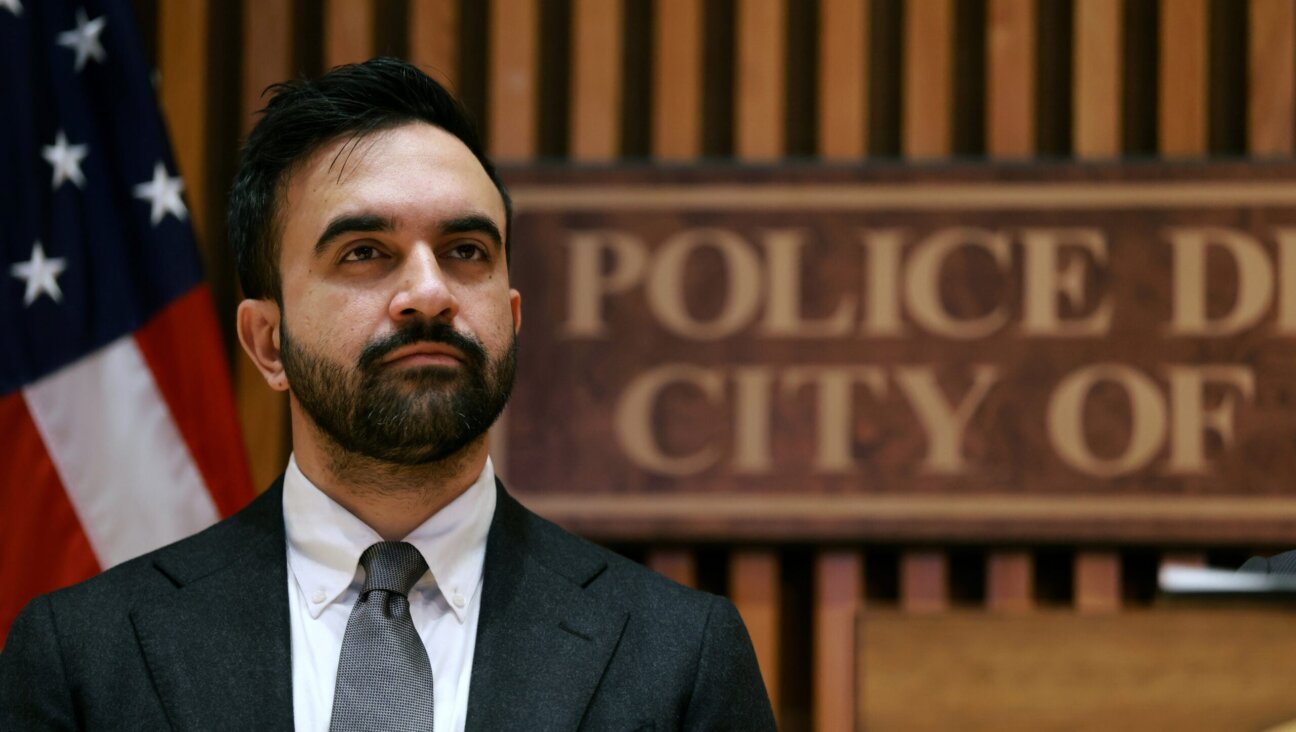Younger Than That Now

Graphic by Angelie Zaslavsky
Earlier this week, Kathy Ebel wrote about her German-Jewish family and Nice Jewish Girl protagonists from New York City. Her first novel, “Claudia Silver to the Rescue” (Houghton Mifflin Harcourt), is now available. Her blog posts are featured on The Arty Semite courtesy of the Jewish Book Council and My Jewish Learning’s Author Blog Series. For more information on the series, please visit:
Memorial Day, 2007. I’ve drifted away from a Santa Monica beach party to gaze out at the Pacific Ocean, plus my navel, when an unfamiliar woman approaches. We chat a bit—she’s a literary agent based in New York, the sister of the hostess—and then she asks the dreaded question. “So…what are you working on these days?” I pause to consider before answering. You know when people say to cute, charismatic single women, “You’re so fabulous—I just can’t believe you’re single!” and they want to punch them in the face and then kill themselves? This was a work version of that.
You see, I’ve been living in Los Angeles for seven years, having left my native New York City to seek my fortune as a screenwriter with a soap opera credit and a fresh pile of TV spec scripts in my kit bag, but the steady ascent I’ve pictured, and that I’ve seen other people achieve, hasn’t happened. I’ve been working so damn hard for so long and I feel like I’m nowhere, other than crushed. How could that be, when I’ve done everything I’ve seen other people doing—and what my various agents have told me to do?
I mean: I got a driver’s license at age 30 in order to drive cross-country in a U-Haul piled with whatever possessions my husband and I didn’t sell when we left Brooklyn. I sat in a rented house in the Hollywood Dell with a vintage metal desk and a pristine view of a walled garden that gave me a squirrely Barton Fink feeling, and I cranked out material and rolled calls. I got a job on a show—the researcher on Law&Order:SVU in its first season—and I wrote two freelance episodes…but I wasn’t put on staff. I re-wrote a teen comedy feature for Paramount…but my broadly comic take was poorly received. I sold a TV dramedy pilot, a high school musical…but the executives involved walked away when I’d banked they’d burst into song. Eventually, motivated by the stretches of unemployment between these gigs, I developed a freelance sideline, writing copy for entertainment-based ad campaigns. And then, just weeks before the beach party at which I’m now a wallflower, a literary manager who’s read what I thought were my best scripts delivers a disturbing critique. “Your work is solid,” she says. “It’s well written and it proves you can do it. But I can’t do anything with it, because it’s generic. I would be interested in working with you, but first I’d need to see material that only you could write. Write some new stuff this summer and send it over after Labor Day.” Generic? New stuff? Sounds like me? Fecch.
Beach Party Book Agent is staring at me. I repeat her question. “What am I working on these days?” Then: “I actually have no idea.” She kindly offers to read anything I write, if I’d ever care to send it along. I thank her politely and turn back to my doubtful view of the horizon. Whatever the fuck that would be, I think to myself.Then I kick some sand.
A few weeks later, when I sit down at my desk, I’m surprised by what comes out. Not a TV pilot in the vein of somebody else’s hit cable series, or a high-concept romantic comedy involving an action sequence and a makeover montage to which Reese Witherspoon may want to attach. It’s a short story, with a title inspired by Morrissey (Hold On To Your Friends) and a main character named Claudia Silver, in which Claudia is visited by the ghost of an estranged friendship. I haven’t written one of these puppies in close to 15 years.
Back then, at Barnard College, I pursued a double major in English literature and creative writing. My tumultuous upbringing, marked by most of the foibles of the 1970’s along the sex, drugs, and divorce axis, drove me not just to succeed, but to survive. I dreamed of becoming a novelist, but, as I neared graduation, my dream seemed ever more unlikely and irresponsible. How dare I think I could possibly make a living doing what I love? So, following the lead of college friends who headed for film or drama schools or straight to Hollywood, I told myself I would achieve a lucrative screenwriting career. Someday, around the age of (gasp) 40, having acquired a hefty pile of credits, cash, and prizes, and achieving the security I had never known, I would reward myself by allowing myself to write novels. Having honed this world view as an insecure 19-year-old, I lugged it with me for the next two decades.
Labor Day, 2007. The summer has passed, and I’ve written three stories, all about the same character: Claudia Silver, a 24-year-old maybe not-so-Nice Jewish Girl from Brooklyn prone to personal drama. The manager who judged my scripts “generic” months before calls me a few weeks later. “These are great!” she exclaims. “You need a literary agent.” I remember the conversation I’d had at the beach party months before. When I tell the manager about it, she’s silent for a beat. Then, somewhat astounded, she reveals that the woman I’d met is a hugely respected heavy-hitter in the book business, known for her taste and influence. “She may not respond,” the manager warns, “but you should go for it.”
I send Big Deal Beach Party Book Agent my stories, and she gives me the greatest compliment of my entire career. “You,” she says, “are hot shit.” She tells me that what I must do next is write a novel, and if I do, she will sell it. It takes me yet another year and half to turn the ship around. In that time, as fate has it, I finally land a staff writer position, on the CBS cop show Cold Case, where I work hard and make great friends, but am not very good at my job. In the writers’ room, while everybody else is hotly debating the placement of DNA evidence, all I can think is: “The victim’s in a Diane Von Furstenberg wrap dress, with a navy and red geometric print.” When I’m not asked back to the show, I’m finally ready to stop trying so hard.
I part ways with my TV agents and sign with Big Deal Beach Party Book Agent. I land a day job in entertainment advertising, begin a 40-hour corporate work week, and start rising at 4 am in order to write “Claudia Silver to the Rescue.” I liberally apply my TV experience to my fiction writing. I structure the tangled web of my book’s heavily populated plot as a detailed outline, from which I write closely. I end every section of the story with an “act out”—w anting my audience to come back after the commercial break. I “cast” my ensemble of characters with the perfect actors for the parts and block the scenes in my mind, and I select design elements with maniacal exactitude and endlessly move them around. As I write, I also find inspiration in shows that I experience as novels unspooling on the screen: The Sopranos, The Wire, and the one I can’t live without, Mad Men.
As for the backwards world view I’d been carrying on my back for two decades, the one that said I must delay what I love to write until I’ve earned the right? I finally put it down. Man, was it heavy. What am I working on these days? My next novel.
It’s about a television show.
Kathy Ebel, a first-generation American, was born in Manhattan. Her blog, Fatherland: There’s No Place Like Home, or How and Why a Nice Jewish Girl Asked Germany to Take Her Back, chronicles her quest to have her German citizenship restored. Kathy considers Brooklyn her hometown and currently lives with her family in Los Angeles. “Claudia Silver to the Rescue” (Houghton Mifflin Harcourt) is her first novel.
The Jewish Book Council is a not-for-profit organization devoted to the reading, writing and publishing of Jewish literature. For more Jewish literary blog posts, reviews of Jewish books and book club resources, and to learn about awards and conferences, please visit www.jewishbookcouncil.org.
MyJewishLearning.com is the leading transdenominational website of Jewish information and education. Visit My Jewish Learning for thousands of articles on Judaism, Jewish holidays, Jewish history and more.
















